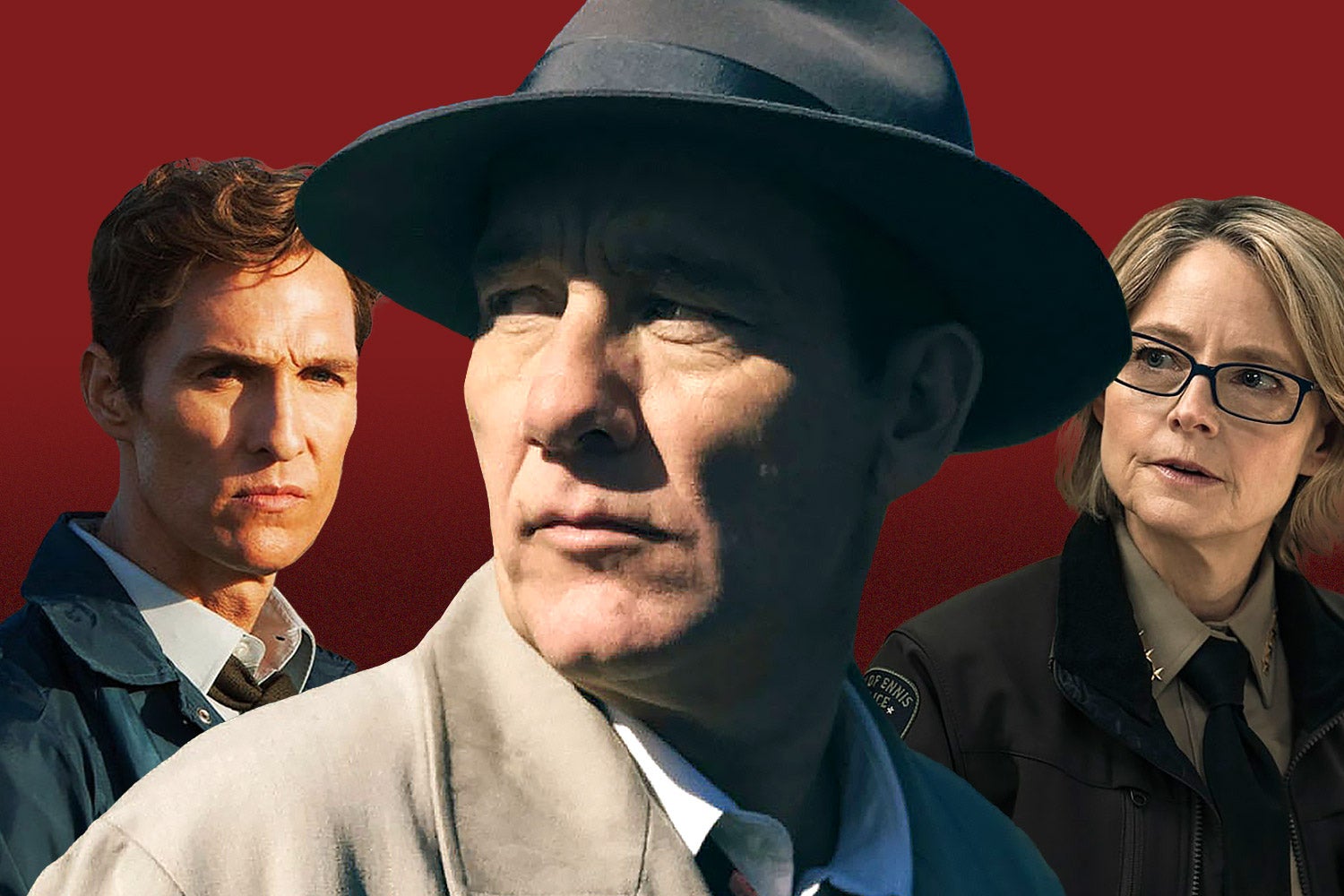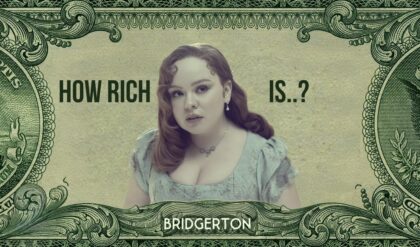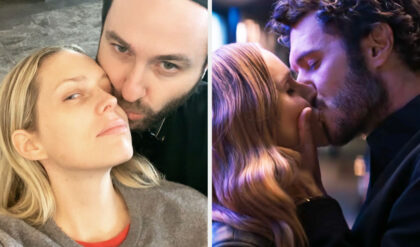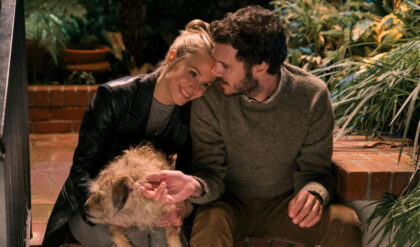
Of all our exhausted genres, the detective story might be the most tired. For many of today’s popular offerings—“cozy” mysteries, Law & Order—predictability is the point; the audience would revolt if you deviated from the formula. But once in a while, a work comes along that offers something new. One of the finest in the past decade was the debut season of True Detective. Last month, with the premiere of True Detective: Night Country approaching, I sat down to rewatch the older season for the first time since it aired on HBO in 2014. I expected to be disappointed by what is widely considered one of the crown jewels of the waning Peak TV era; after all, 10 years is a long time, and the decline of the series over subsequent seasons made me wonder if that first one might have been overhyped. It turns out that it was just as good as I remembered—only, I was surprised to find, I had completely misread the source of the show’s appeal.
Season 1 unfolds along two parallel timelines; in the past, we see Rust (Matthew McConaughey) and Marty (Woody Harrelson) pursuing a serial killer, while in the present we see the two men, older and beset by regrets, being interrogated about their conduct on that earlier case. As the timelines progress in tandem, the viewer realizes that neither man is a reliable narrator, of their own motivations nor of actual events. The tension between the two timelines, and the widening divergence between the truth and the official account, is the real engine of the show. The gothic-bayou atmospherics and the serial-killer conspiracy, which the audience found so compelling back in 2014, is really just window dressing; the question of how the two men go from partners to bitter enemies is far more compelling than the identity of “the Yellow King” or the question of who killed Dora Lange. The fact that the story’s fuse was burning from both ends, so to speak, meant that, instead of cruising toward a distant ending, it often felt like the ending was closing in around you.

I’d be hard-pressed to think of a show of this narrative sophistication since, countless imitators notwithstanding. Even True Detective’s would-be successor, the fourth and current season—and the first of the series to be created without the involvement of Nic Pizzolatto, who created and headed up the show’s first three seasons—falls grievously short. So far, Night Country feels very safe and paper-thin. Depending on your perspective, it’s either a loving homage to or a cynical recapitulation of the first season. Two cops (women this time, instead of men), a frozen setting instead of a steamy one, a mysterious crime (dead men instead of dead women), plenty of callbacks—the spiral symbol, the evil Tuttle family. And yet, somehow, it adds up to less than the sum of its parts. The season’s showrunner, Mexican filmmaker Issa López, seems to have fallen into the same trap I did: assuming that what made the first season of True Detective good was the mystery, when in fact it was the most disposable element of the show. (This is why the season finale was met with almost universal disappointment back in 2014: because once the timelines resolved and the show became a straightforward whodunit, it was bound to feel watered down.)
Gone are Rust Cohle’s ludicrously audacious monologues, the relentlessly diamond-sharp gutter poetry uttered by Vince Vaughn’s Season 2 downwardly mobile gangster, the show’s sly touches of humor (“what’s scented meat?”), the intricate set pieces. What we end up with is a serviceable, but bland and thoroughly conventional, procedural centered around the puzzle of who—or what—killed the group of scientists. The characters feel sketched-in, and they exchange lines like “Hate you,” “Hate you, too”—a ChatGPT version of Mametspeak. The main limitation of this type of narrative is its linearity; the only way to propel forward is to dispense information. You can speed things up by dispensing more information in the form of clues, or slow things down by dispensing less, but you’re essentially stuck on rails. So far, the show has proceeded at a crawl; after four episodes, we’ve learned more or less nothing, though we have seen a lot of people talking on the phone and driving around. Straightforward whodunits can be satisfyingly executed, to be sure, but Night Country takes a paint-by-numbers approach, alternating between clumsy expository scenes and cheap jump scares, then repeating the expository scenes in case you were looking at your phone the first time around. (How many times have we seen the ice cave video—six? 10?) The end result feels more like a “second screen” show dumped on Hulu than a high-budget, carefully crafted HBO production.
But, luckily, there is a narratively layered, ambitious, hourlong prestige drama airing on Sundays that strikes a similar note as True Detective’s first season. It’s not on HBO; it’s on AMC+, and it’s called Monsieur Spade. It’s a sprawling, strange show that transplants The Maltese Falcon gumshoe Sam Spade (with Clive Owen taking on the role most famously played by Humphrey Bogart) into the south of France, where he is embroiled in a labyrinthine plot involving the Algerian War, a teenage ward, murdered nuns, the French CIA, and an Arab child prodigy. Monsieur Spade is the work of TV veteran Tom Fontana (Homicide: Life on the Street, Oz) and screenwriter Scott Frank, subject of a recent New Yorker profile in which he professes, with some regret, that he spent most of his working life on “safe” gigs, doctoring scripts for blockbusters like Minority Report and The Hunger Games. After resolving to work on his own ideas, Frank made the well-regarded Netflix miniseries Godless and the pandemic-era sensation The Queen’s Gambit. Neither are “safe” ideas; the former is an all-female Western, and the latter is a show about chess.
Monsieur Spade is equally gutsy. The show offers very little in the way of exposition, jumps between timelines promiscuously, and consistently favors ambiguity over answers. How did Spade’s French wife Gabrielle die in the eight-year gap between the show’s two timelines? How and why exactly did Spade arrange for the village troublemaker to be shipped off to Algeria, and why has he returned? Why is everyone chasing the child? We’re not told, and somehow it doesn’t matter. Omission as a narrative strategy is hard to pull off, especially in television, but the confidence of the editing and the polish of the dialogue assure you that there’s an unseen superstructure holding Monsieur Spade together. Rather than frustrate, the unknowns here pile up to generate narrative tension—not only regarding concrete plot points like who killed the nuns, but also broader questions like how much responsibility does Spade bear for the fate of the man he sent off to war, and what might that say about his moral fiber. The result is a show that draws narrative energy from unexpected sources and comes at you from oblique angles. Although it’s completely different from that first season of True Detective, it is one of the only shows I’ve seen in the past decade that has come close to reproducing its texture and density.

Monsieur Spade also benefits from a certain degree of star quality and glamour, which has always been True Detective’s true ace in the hole. Matthew McConaughey, playing Rust Cohle in Season 1, was at his absolute zenith: brooding, chain-smoking, the physique of a welterweight boxer, vamping around in ludicrously tight button-ups while intoning proto-Nietzschean monologues, his pretentiousness always undercut just when it threatened to become intolerable by a pitch-perfect, equally good—albeit in a much less glamorous role—Woody Harrelson. True Detective knew how to skillfully deploy McConaughey’s charisma, and the same went for subsequent seasons; the unfairly maligned second season was carried by career turns from Vince Vaughn and Colin Farrell, and the understated third season was anchored by Oscar winner Mahershala Ali and a superb Carmen Ejogo.
In Monsieur Spade, Clive Owen is perfect for a period piece set in the 1960s, playing a character who helped give shape to the hard-boiled detective genre in Dashiell Hammett’s novel nearly a century ago. Owen, like pre–True Detective McConaughey, has always seemed like a star in search of a defining role. As a screen presence, Owen combines some of the sophistication of Cary Grant with the louche menace of Richard Burton; he seems like a guy who knows the difference between a full and half-Windsor knot, but would also throw you through a plate-glass window if you made a snarky comment about Shoot ’Em Up (2007). He would’ve been the best James Bond since Sean Connery. But, in an era that prizes whimsy and boyishness in its male stars, the 59-year-old Owen, who almost always towers above his co-stars and delivers his lines in a low growl that often sounds like it’s being played back at half-speed, seems like an anachronism. Those qualities are put to good use in Monsieur Spade, the result being one of those rare confluences of talent and opportunity. When various underworld figures refer to Spade’s reputation as a hard man, you believe them, and when the show audaciously cuts from Spade’s initial meeting with the wealthy French widow to them agreeing, some days or weeks later, to get married, it doesn’t seem jarring—we get it. I mean, look at the guy’s tailoring.
News
How did Jodie Foster typecast herself by being so good at her job?
Jodie Foster has portrayed a wide range of characters on screen. She captured hearts as the precocious teen in Freaky Friday and stunned audiences with her role in Taxi Driver. In The Silence of the Lambs and Panic Room, she demonstrated a steely resolve paired with human…
Jodie Foster sets her next film, and more casting news this week
Jodie Foster is going from Night Country to wine country. According to Variety, the Academy Award-winning actress has set her first project since starring in True Detective‘s fourth season earlier this year. She’ll lead the film Vie Privée, an upcoming French language project from director Rebecca…
Justin Bieber has ‘alienated’ people around him amid ex-mentor Sean Diddy’s arrest: ‘His family members are…’
Justin Bieber has “alienated” people around him as he “doesn’t trust them”, said an insider, claiming that the singer has done “some really crazy s-t.” While Justin Bieber has strongly rejected any connection with the allegations against Sean Diddy Combs, the American…
Oscar-Winner Jodie Foster Cast in Rebecca Zlotowski’s Latest French Film
Jodie Foster Cast in New French Film Academy Award-winning actress, Jodie Foster, has come on board the latest film from director Rebecca Zlotowski, Vie Privée. Jodie Foster, who is fluent in French, will be starring in the upcoming international film, Vie Privée. This film…
‘Yellowjackets’ Season 3: Everything To Know So Far About The Doomed Team’s Return To The Wilderness
Yellowjackets has been streaming on Paramount+ for years, but the survival/coming-of-age series recently received the famed Netflix boost. The series’ second season did lose some momentum while it aired, and that season isn’t on Netflix as of yet (and hopefully, you aren’t reading…
Jodie Foster Reacts To First Emmy Win
Jodie Foster, one of the most celebrated actresses of our time, has made headlines with her recent Emmy win, marking a remarkable comeback year in her illustrious career. After being nominated for an Academy Award for the first time in…
End of content
No more pages to load











